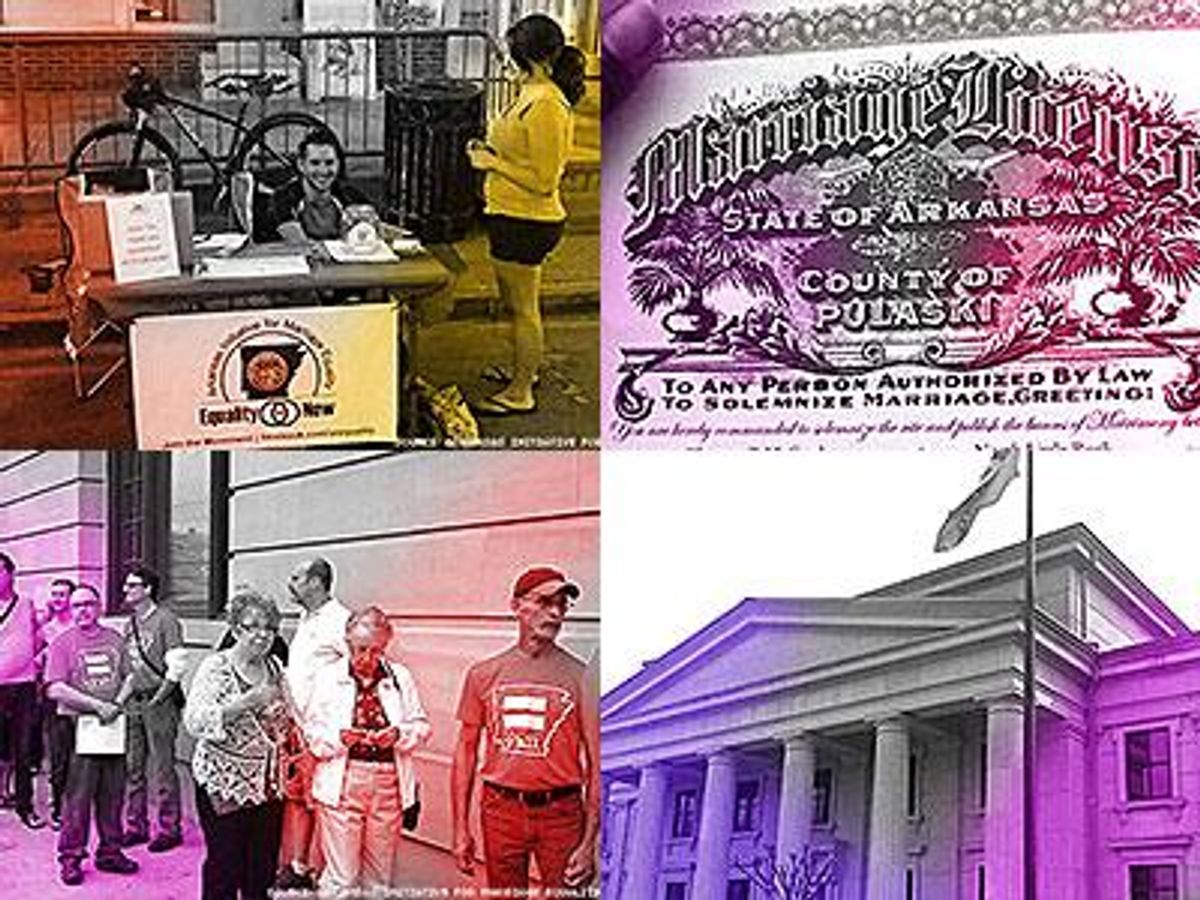 What's Happening in Arkansas?
What's Happening in Arkansas?
A state and a federal judge both ruled in separate cases in 2014 that the state's marriage ban is unconstitutional. Those decisions are stayed pending appeals.
Litigation in the state has moved fairly quickly, with both cases less than two years old. In the case in state court, Judge Chris Piazza (pictured, via the Arkansas Democrat-Gazette) found the state's voter-approved marriage ban unconstitutional in May 2014, and Arkansas officials appealed that decision to the state Supreme Court. In the federal case, Judge Kristine G. Baker overturned the state's ban in November 2014. That case is likely to be appealed as well. Both decisions are currently stayed as the state appeals.
 What Happens Next?
What Happens Next?
We could get another ruling in Arkansas very soon. The state Supreme Court heard oral arguments November 20 and could issue a ruling at any time.
The federal case is a little more complicated. Former Attorney General Dustin McDaniel did not officially announce whether he planned to appeal, and he left office in January. McDaniel, a Democrat, has said he personally supports marriage equality but was duty-bound to defend the laws of the state. Upon his departure, he appeared to be coordinating the state's next moves with his replacement, Republican Leslie Rutledge.
In late January, Rutledge requested new oral arguments be heard before the Arkansas Supreme Court regarding Piazza's decision, since some of the current justices were not seated on the bench when the state's high court first heard arguments on marriage equality last November, according to progressive news outlet Arkansas Times.
It's hard to predict exactly what will happen if the Arkansas Supreme Court rules before the federal case has time to move along. It's possible that the state court could overturn the marriage ban, only to have a federal court rule that the ban is legal -- or it could go the other way around. Generally, federal rulings trump state rulings in these areas.
 How Do Arkansans Feel About Marriage Equality?
How Do Arkansans Feel About Marriage Equality?
Arkansas is particularly hostile to LGBT equality. Most polling data has been collected only over just the last year, and shows support growing, but hovering in the high 20- to mid-30-percent range. A May 2014 report from Public Policy Polling found that overall support for some sort of relationship recognition for same-sex couples (including civil unions) is at 53 percent, while just 27 percent support full marriage equality. That's about where public support was a decade ago, when 75 percent of voters approved a constitutional ban on marriage and civil unions.
Two different groups have submitted ballot measures to overturn the state's ban, one which hoped to make the ballot in 2014 and the other in 2016. Former Attorney General Dustin McDaniel repeatedly rejected both proposals during the summer of 2013, finally allowing them to move ahead late in the year. Both efforts have since stalled.
 Can Gay and Lesbian Couples Get Married in Arkansas?
Can Gay and Lesbian Couples Get Married in Arkansas?
Not right now, though they briefly could marry in May. When Judge Piazza overturned the ban in state court, he did not impose a stay, and same-sex couples were able to wed for about a week. The state Supreme Court eventually stepped in and halted the weddings.
The same private attorney who filed the suit that saw Piazza's pro-equality ruling filed another lawsuit this February seeking recognition of the estimated 600 same-sex marriages that took place during Arkansas's brief marriage equality window last May.
It's possible that the state could have another window of marriage equality soon. Because there are cases pending in both state and federal court, a ruling in one could allow marriage to start while a ruling in the other could halt it again. Marriage licenses issued during those windows are most likely valid, but could be contested by the state.
 What Are the Arguments for Marriage Equality?
What Are the Arguments for Marriage Equality?
The Arkansas plaintiffs have made familiar arguments, similar to those that have been successful in most other states. Crucially, the same-sex couples argued -- and the federal court agreed -- that laws discriminating on the basis of sexual orientation should be subject to strict scrutiny, as are laws that discriminate regarding other immutable characteristics, like race and sex. This level of review will provide greater protection to LGBT people not only in marriage cases, but potentially in cases concerning other antigay laws as well.
The plaintiffs also claimed that the marriage ban restricted their right to travel, since marriage licenses obtained in one state would vanish once they re-entered Arkansas. The court rejected that argument.
 What Are the Arguments Against Marriage Equality?
What Are the Arguments Against Marriage Equality?
The state's claims are all the same boilerplate antigay arguments that have failed in most other federal courts. Lawyers for Arkansas claim that the 1972 case Baker v. Nelson indicates that the federal government has no stake in marriage equality and federal courts should not rule on the constitutionality of the ban. However, other courts have determined that significant doctrinal developments in favor of LGBT equality since the Baker decision override that precedent.
The state also put forth claims about "responsible procreation" and "defending tradition," which Judge Baker dismissed out of hand.
Arkansas also argues that states and voters should be allowed to determine the state's marriage laws, immune from the requirements of the U.S. Constitution.


 What's Happening in Arkansas?
What's Happening in Arkansas? What Happens Next?
What Happens Next?





























 How Do Arkansans Feel About Marriage Equality?
How Do Arkansans Feel About Marriage Equality? Can Gay and Lesbian Couples Get Married in Arkansas?
Can Gay and Lesbian Couples Get Married in Arkansas? What Are the Arguments for Marriage Equality?
What Are the Arguments for Marriage Equality? What Are the Arguments Against Marriage Equality?
What Are the Arguments Against Marriage Equality?


















































